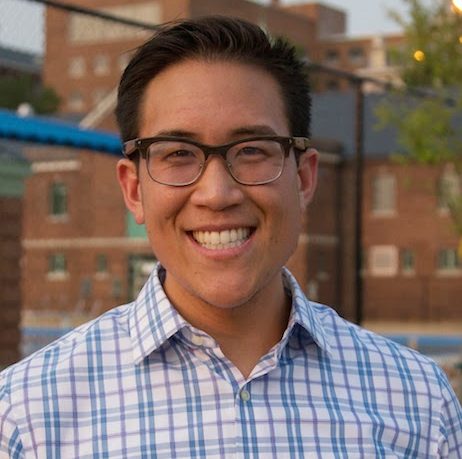Elections are coming up November 4th in DC, and one of the races being contested is the Ward 1 representative of the DC State Board of Education. In order to shine some light on a race that doesn’t get a lot of press, but is very important to local parents, I’m interviewing the four candidates for the board: David Do, Lillian Perdomo, Laura Wilson Phelan, E. Gail Anderson Holness and Scott Simpson.
So far we’ve heard from Laura Wilson Phelan and Lillian Perdomo, and today is David Do. My questions are in bold, his answers after.

NCH: Why are you running?
DD: I decided to run for the Ward 1 Member of the State Board of Education because it was an opportunity to bring my background and life experience to Ward 1 students who are struggling to succeed in our schools. My parents were refugees of the Vietnam War and came to the U.S. with nothing. My family lived in poverty. Today, many of our kids in Ward 1 are still living in poverty. I want to bring that perspective to the board and make sure that every child has access to a good quality education.
I am also running because of the encouragement and support of our community and neighborhood parents. The encouragement came because of my tireless work and tremendous accomplishments at Bruce Monroe at Park View Elementary, the Park View Recreation Center, and our community as a whole. I will bring the same record of accomplishment and energy to the Board of Education.
Finally, tests like the DC CAS said I was basic or below proficient, the SAT said I should have never went to college, and my first semester of college grades put me on the verge of academic probation. But, I never let the possibility of failure hold me back. What changed in my academic career was a mentor. My introductory economics professor helped me develop my interest in economics. Once I discovered my talent and interest in economics, I exceled tremendously and graduated from college with honors and received the University’s Legacy Award. Tests should never be the end all and be all of education. Tests can help with accessing where our children are and be used a good diagnostic tool to help teachers identify problem areas. On the other hand, high-stakes testing has led to less collaboration and incentivized cheating in our schools. We need reform that everyone can respect.
Finally, I have the experience and results to make sure that we have a strong advocate on the school board. Here are some of the things that I have accomplished:
- Fought for safety improvements for our school-aged children including a signaled crosswalk for E.L. Haynes Public Charter School on Georgia Avenue.
- Volunteered at Bruce Monroe @ Park View Elementary for three years and seeing it improve dramatically. In recent months we have seen an influx of new parents and the school has received a lot of praise.
- Mentored two high-school seniors including a young lady from Ward 1 who will be graduating from Penn State University this spring. I made sure that they had the resources to succeed by providing a variety of workshops to get them prepared for college and employment.
- Tutored a first-grader who was below reading level at a DC public school and raised him to the appropriate reading level.
- I currently serve as a teaching assistant at the University of Maryland, College Park. I have taught undergraduate students a course titled, “Planning for an Elderly Community.”
- Served as Director of Academic Affairs at the University of California, Merced, where I was an advocate for our students. I got the Fellowship and Undergraduate Research Symposium (FURS) Act funded. This program allowed students to present their research across the country. I also funded tutoring services, stress relief events, and dinner programs for students.
I have been an education advocate and would be a strong voice for Ward 1 on the Board of Education.
NCH: How would you explain the role of the State Board of Education?
DD: The Board of Education has a variety of roles in setting state standards for education. How I describe the role of the school board to parents and community members is that it sets the vision for our school system. It works on high school graduation requirements, federal education standards through the Elementary Secondary Education Act, No Child Left Behind, and Race to the Top, the implementation of education standards like the Common Core State Standards, the types of primary and supplemental education models to use, teacher accreditation and credentialing, parent involvement standards, and many other important functions. The Board provides an overarching vision for our school system. The implementation of this vision will require a strong advocate; I have been an advocate with proven results. I will be the advocate Ward 1 needs on the school board.
There are also a variety of committees that members are responsible for. I want to be a part of the Parental and Home Engagement Committee on the State Board of Education. It is a committee that I personally feel will best suit my background and experience. There is a lot of research to support the benefits of family engagement in our schools. That is why I will work within my role on the Board of Education to consider all point of views in establishing an effective and implementable plan for parental and home engagement for our schools.
NCH: Are there any major changes you’d propose for the Board itself?
DD: I want to bring my experience working for our local neighborhood school Bruce Monroe @ Park View Elementary to the board. We have seen tremendous improvements when different groups work together to create a collaborative and community approach to improving education. A top-down approach where collaboration was not part of the equation has not worked in the last seven years of corporate education reform. We need to take a different tack to education reform. I will advocate for a more supportive and respectful process that includes all stakeholders.
Moreover, I will also work to bring more democratic control to the Board of Education. I would strongly advocate for the Board to have oversight of the Office of the State Superintendent for Education (OSSE). This oversight will bring much needed transparency to OSSE’s operations and give Ward 1 a stronger voice in advocating for education policy.
NCH: Tell us your thoughts on the redistricting process, both the most recent and how it should be done in the future.
DD: The school boundaries have been implemented by Mayor Gray, they will start the next school year. There are both positives and negatives about the plan. The chief positive for our feeder patterns is that there is predictability in where we send our children. Previously, an elementary school would feed into multiple middle and high schools providing unpredictability for parents. The patterns are now predictable. For example, my neighborhood school Bruce Monroe @ Park View Elementary will feed into the proposed new MacFarland Middle School, and then into the new Roosevelt High School. This gives parents the opportunity to know where their children will be attending middle and high school. It will also allow parents to work together to improve the middle and high schools. Previously, the elementary school may have fed into multiple middle and high schools providing very little predictability. Another benefit is that feeder patterns for Bancroft will stay intact. This is the predictability that parents and I have been advocating for. Also, for the first time Oyster-Adams Education Campus will incorporate some neighborhoods of Adams Morgan that should have been party of the school’s boundary for a very long time. This critical issue has been important to neighborhood residents and it is exciting for parents and community members to receive what they have been working towards for many years.
Unfortunately, there have been concerns especially about non-bilingual schools feeding into the Columbia Heights Education Campus where as many as 80% of courses are taught in both English and Spanish. There are concerns that schools like H.D. Cooke which is an IB school will not have prepared our students sufficiently for a bilingual education.
Overall, the boundary plan is a step in the right direction. But there needs to be more efforts in improving overall school quality including middle and high school. We must also make sure that our minority and impoverished students have the right conditions to succeed but at the same time give all of our students the resources to develop and expand their education, skills, and special talents.
NCH: What’s the biggest problem DC schools face?
DD: The biggest problem that we face is the number of our children who are homeless or living below the poverty line. When our children are thinking about where they will sleep and eat they are not thinking about education. When our children are not getting the appropriate medical care they are falling behind. In Ward 1, every one of our traditional elementary schools are Title I schools. This means that in each of our schools we have over 35% of our kids living in poverty. This number is likely to be much higher.
As someone who grew up in poverty I understand that wrap-around medical services, good prenatal care for every woman, nutrition programs, and early intervention programs are all key in improving the overall educational success of our children.
We have failed to see that poverty aversely affects our most vulnerable students. We must provide a strong social safety for our students and make sure they have the medical services to succeed academically. Non-profits like Mary’s Center that work with our public schools are invaluable. Mary’s Center provides mobile medical facilities that offers hearing, eye, and dental services for every child. Often times families with less resources are unable to provide this medical care for their children. Mary’s Center offers these services free of charge and allows them to address issues earlier so that all children are on the same level playing field when they are learning. I will work to strengthen these partnerships on the school board.
DCPS also has a good early intervention program, there have been several parents that I have talked to who have taken advantage of the program. Physicians are trained to recognize cognitive and development issues early on so that the child receives the necessary help from DCPS to catch up with their peers. There have been issues with children transitioning from early intervention to pre-school, this will be something I will look at when elected to the board of education. I am a big proponent of starting from the beginning. If we can fix a problem earlier then we will have fixed chronic issues that may follow a student throughout their education. We must allow our public schools to work with partners to provide the medical and early intervention services so that all of our children can succeed.
We cannot stop there. We also need to make sure that our schools have a rich, balanced, and full curriculum so that all students are challenged academically. I will advocate for reading and math, but also a healthy curriculum that includes world languages, the arts, music, geography, civics, and physical education. This will keep our children interested in our school system and attract families that value these additional programs.
NCH: How did you get interested in running for the board, and do you have children in DC public schools?
DD: I got interested in running for the board of education because like many of our kids in Ward 1, I lived in poverty. I was an English Language Learner and a daily recipient of free and reduced meals. Many of our kids are still facing poverty today. I was also encouraged to run the campaign by parents who saw my hard work in improving our neighborhood schools, mentoring our children, and fighting for our community. They believe that I would be the right advocate for the school board.
Despite not having kids in the school system I have volunteered at Bruce Monroe @ Park View Elementary for over three years. I have also mentored children and been an active part of the public education system. I did everything that was necessary to fulfill my duties as a community member and make sure that our neighborhood school was a great learning environment for all children. I have worked in our school system and want to continue working for our schools on the board of education.
NCH: Where can people go for more information about your campaign?
DD: I am running a campaign on accessibility and communication. Anyone can reach me directly by phone at 202-709-9278.
You can also email me at david@davidforwardone.com. Please also visit my website at http://www.DavidforWardOne.com




